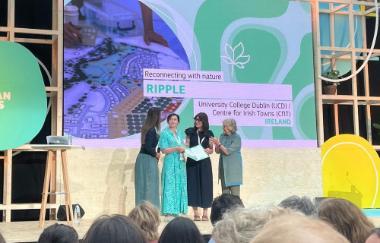 The Ripple community project led by UCD Centre for Irish Towns has been awarded a New European Bauhaus Prize in the “connecting with nature” category. Announced at an Awards Ceremony in Brussels last night, this is the first ever Irish entry to win the prize.
The Ripple community project led by UCD Centre for Irish Towns has been awarded a New European Bauhaus Prize in the “connecting with nature” category. Announced at an Awards Ceremony in Brussels last night, this is the first ever Irish entry to win the prize.
The New European Bauhaus (NEB) Prizes recognise projects that demonstrate how sustainable solutions promoted by the European Green Deal can be inclusive and beautiful, and bring high-quality experiences to people's everyday lives.
Out of 1400 applicants from across the EU and the Western Balkans, 15 winners will receive a monetary prize of up to €30,000 and a communication package to help them further develop and promote their projects and concepts.
Elisa Ferreira, EU Commissioner for Cohesion and Reforms said: “These Prizes recognise bottom-up initiatives embodying the NEB values: beauty, sustainability, inclusivity. Transforming and improving people’s lives, as well as empowering local communities are key principles of Cohesion policy. This is why we have been supporting the NEB community from the very beginning. The NEB and Cohesion association is turning bright ideas into inspiring projects.”
The Project: Ripple
Public green spaces, common in housing estates throughout Ireland, represent a significant untapped resource for climate action, through their potential transformation as water resilient, productive and socially cohesive public space.
Ripple trialled a collaborative place-based approach to climate resilient green space in towns. Funded under the Government of Ireland ‘Creative Ireland’ programme, with support from Mayo County Council, the project was coordinated between Ballina Green Towns, UCD Centre for Irish Towns, local artist Rionach Ní Néill, and the community of Greenhills Estate, Ballina.
A core tenet of climate resilience is to “leave no person or place behind”. The UCD Centre for Irish Towns team (Orla Murphy, Dr Philip Crowe and Rebecca O'Malley, UCD School of Architecture, Planning and Environmental Policy, and Dr Sara Cotterill, UCD School of Civil Engineering) was keen to trial this approach with a community that had faced socio-economic challenges to see if a model of respectful support, listening and engagement could generate a positive ripple-effect. Working together, they built the ‘Paradise Garden’, a climate-friendly intergenerational amenity space and wildlife haven, where rainwater is slowed through a series of rills, wells and natural attenuation on its way to the river.
The process involved Storymapping, Co-Design, Making and Evaluation stages. The team gathered the experiences and perspectives of residents about water and neighbourhood green spaces. 16 prospective ideas were co-designed and voted upon. The preferred idea – the Paradise Garden, features a tree nursery for local oaks, heritage fruit trees, vegetable beds, pollinator friendly planting, and nature based play. Rainwater is slowed through a series of rills, wells and natural attenuation features on its way to the river.
The Ripple project has inspired a broad section of the community and has developed a set of tools that can be scaled up and out for application in other communities in Ireland and beyond. Learn more about the Ripple project here. Read the full press release on the 2023 New European Bauhaus Prizes here.